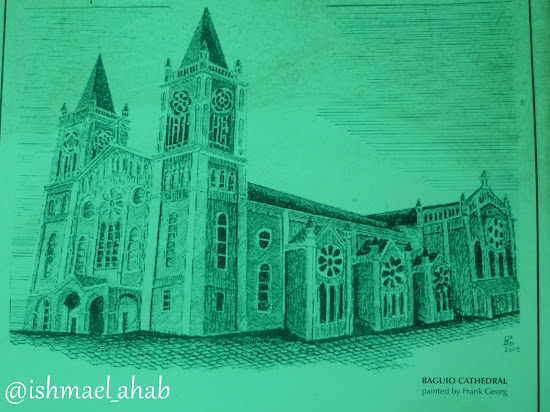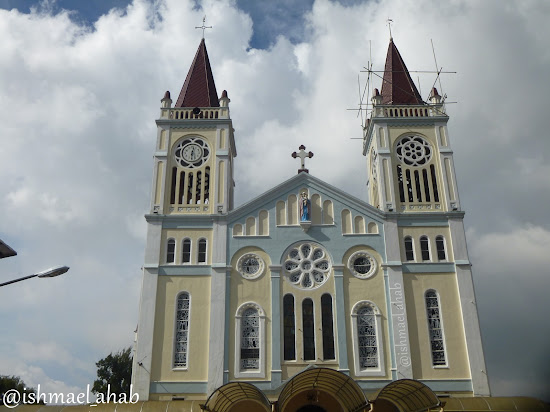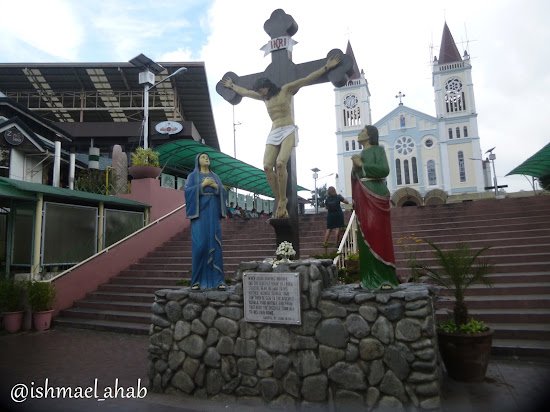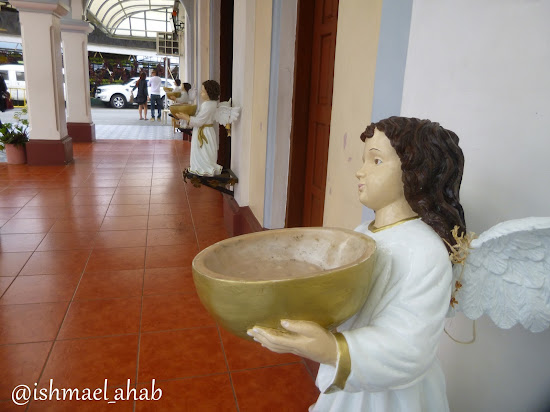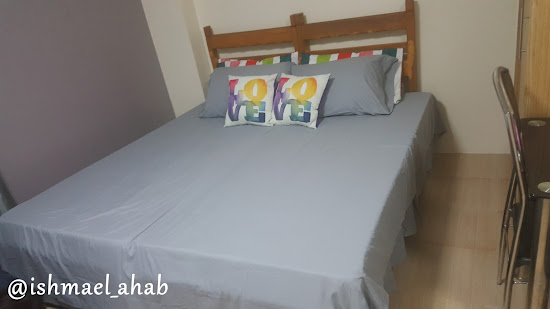Being on top of the hill means that we have to walk up and fight the pull of gravity. In short, we had to climb this steep stairs from Session Road.
Good thing that there are interesting posters at the sides like this drawing of Baguio Cathedral…
Well, my tiredness were immediately forgotten the moment I saw the majestic Baguio Cathedral up close.
Baguio Cathedral was placed under the patronage of Mama Mary under in her title as Our Lady of Atonement. Her image is featured at the facade of Baguio Cathedral.
Baguio Cathedral History
Baguio Cathedral is relatively new compared to other cathedrals in Northern Luzon. The construction of this cathedral was finished in 1936, which is already during the American Colonial Period. The reason for this is that the Spaniards failed to subdue the Igorots during their 300+ years rule in the Philippines. Their military operations, using the lowlanders as soldiers, were not fruitful. Even the missionaries failed to convert the majority of Igorots to the Faith. Igorot's resistance to missionary efforts culminated with the beheading of Fr. Agustin Nino, the friar of Baratao which is now Bauang, La Union.
 |
| The first CICM missionaries in the Philippines (source: CICM Philippines) |
Three of the 11 missionaries went to Baguio City in November 16, 1907. They are Rev. Fr. Oktaaf Vandelwalle, Fr. Serafin Devesse, and Fr. Henry Verbeck.One. They were welcomed by a retired treasurer named Mr. Petrelli, whose house is located along Session Road. Mr. Petrelli's house was transformed into a chapel and was dedicated to St. Patrick. They also built a convent and a school for boys, which eventually became St. Louis University. Fr. Devesse became the first rector of this missionary outpost in Baguio.
 |
| CICM missionaries in the Cordilleras (source: CICM Philippines) |
The construction of Baguio Cathedral started in 1920 and was finished in 1936. Four church bells was donated from Belgium by two non-Catholic friends of Father Carlu, namely Hausermann and Bean. Only 3 bells were installed in Baguio Cathedral and were given these names: St. John, St. Patrick, and St. Walterius. The newly built cathedral was placed under the patronage of Our Lady of the Atonement.
 |
| A view of SM Baguio from Baguio Cathedral. |
 |
| Baguio Cathedral during the Second World War (Source: Basho Fat Sumo) |
- - -
Baguio Cathedral Mass Schedules
For those who are planning to attend the Holy Mass in Baguio Cathedral, here are the mass schedules:
Weekdays: 6:00 AM, 6:30 AM, 7:00 AM, 12:15 PM, and 5:15 PM
Saturdays: 6:00 AM, 6:30 AM, 7:00 AM, 12:15 PM, and 5:00 PM (anticipated Mass)
Sundays: Masses every hour starting 5:00 AM until 7:00 PM
Confession: 4:00 PM to 5:15 PM during weekdays.
The Holy Face Chapel of Baguio Cathedral has the following schedule:
1. Baptism at 10:00 AM every Saturday and Sunday.
2. Children's Mass at 9:00 AM every Sunday.
3. Latin Mass at 4:00 PM every Sunday.
Weddings can also be held inside Baguio Cathedral. I suggest that you contact the admin of Baguio Cathedral for schedules and requirements for wedding.
- - -
Read more about our adventures in Baguio City:
Let's Go to Baguio (Part 1): The Family Adventure Begins
Let's Go to Baguio (Part 2): Our AirBnB Experience in Wharton Condominium
Let's Go to Baguio (Part 3): Family Fun in Burnham Park
Let's Go to Baguio (Part 4): A Refreshing Stop at Baguio Cathedral
Let's Go to Baguio (Part 5): Picking Strawberries in La Trinidad, BenguetLet's Go to Baguio (Part 3): Family Fun in Burnham Park
Let's Go to Baguio (Part 4): A Refreshing Stop at Baguio Cathedral
Let's Go to Baguio (Part 6): Underwhelming Experience in Mines View Park
Let's Go to Baguio (Part 7): A Savory Lunch of Baguio Bulalo at Cinco Antonios Bistro
Let's Go to Baguio (Part 8): Buying Our Favorite Good Shepherd's Ube Jam
Let's Go to Baguio (Part 9): Strolling Right in Wright Park
Let's Go to Baguio (Part 10): The Mansion House - City of Pines' Most Historical House
Let's Go to Baguio (Part 11): Our Family Tour Finale in Botanical Garden
- - -
Some information in this blog post came from the following sources:
Baguio City art exhibit honors German painter from Sunstar
The Case of the Cordillera: An Unresolved National Question from Philippine Social Science Council
A Journey of Faith CICM Missionaries in the Philippines from CICM
Baguio City, Philippines from Basho Fat Sumo
Baguio–where WWII began and ended from Inquirer
Our Lady of the Atonement Cathedral blog
.
Let's Go to Baguio (Part 10): The Mansion House - City of Pines' Most Historical House
Let's Go to Baguio (Part 11): Our Family Tour Finale in Botanical Garden
- - -
Some information in this blog post came from the following sources:
Baguio City art exhibit honors German painter from Sunstar
The Case of the Cordillera: An Unresolved National Question from Philippine Social Science Council
A Journey of Faith CICM Missionaries in the Philippines from CICM
Baguio City, Philippines from Basho Fat Sumo
Baguio–where WWII began and ended from Inquirer
Our Lady of the Atonement Cathedral blog
.




